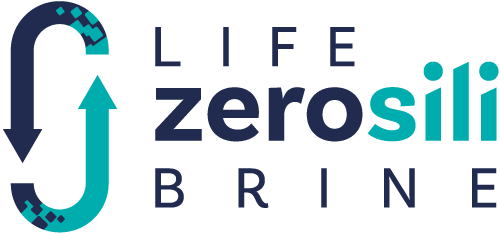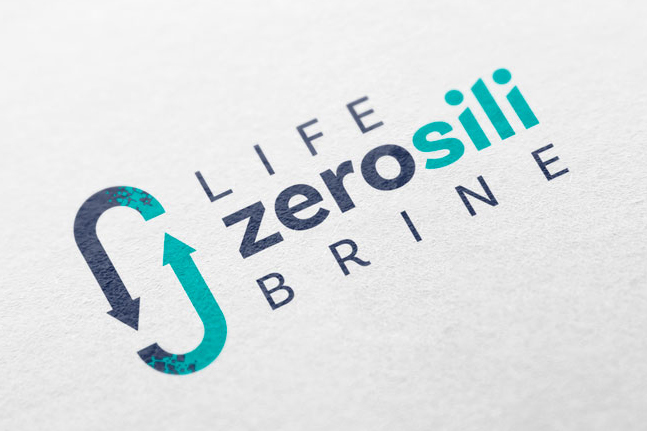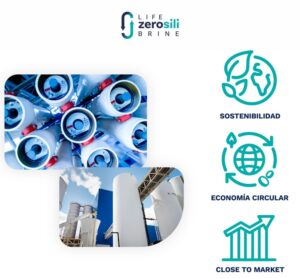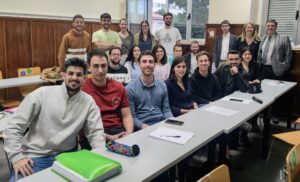Precipitated Silica production process generates as a by-product a high conductivity salt stream that is poured into natural channels after passing through treatment plants. The main salt generated in the process is sodium sulphate that must be removed, along with other components as colloidal silica, by washing, generating a big water consumption. European production of precipitated silica in 2018 reached 720,000 Tons (2,500,000 Tons worldwide) with big growth expectation during next years. It is estimated that this industry is spilling about 500,000 Tons of sodium sulphate to European natural channels. In this context, IQE and EURECAT have developed a reverse osmosis-based process in a small scale (2 m3/h) that solves membrane blocking problems that made unfeasible this technology up to now. This development has been carried out within the framework of the H2020 research and innovation ZeroBrine project (G.A. no 73090) by IQE and EURECAT.
The project entitled Valorisation of precipitated silica wastewater through circular economy strategy for sodium sulphate and water recovery (LIFE ZEROSILIBRINE) address “Resource Efficiency, green and Circular Economy” topic as the main environmental goals is to demostrate a technology that can allow a circular economy model for precipitated silica wastes.
LIFE ZEROSILIBRINE project is a PILOT PROJECT to apply an innovate technology for the treatment of precipitated silica wastes, an environmental challenge with no feasible current solution. This project has been designed by IQE to uptake small scale results (2 m3/h) to a pre-industrial scale (40 m3/h) and validate it before the construction of full industrial site (120 m3/h) after LIFE PROJECT. The implementation of a Circular Economy strategy in precipitated silica sector will allow to mitigate the environmental impact caused by the discharge of the by-product generated (sodium sulphate), recovering 100% of the water for the production process itself (reduction of water collection and reuse of the discharge water as process water) and recovering of sodium sulphate as a high purity product with commecial interest.
This project is a clear example of CIRCULAR ECONOMY project, ensuring the use of secondary resources (precipitated silica waste) as an alternative to natural resources and materials (well water for silica precipitated silica manufacturing and primary sodium sulphate extration).
LIFE ZEROSILIBRINE project is a CLOSE TO MARKET project as it will put in market an environmental solution for precipitated silica wastes and will place in market a secondary anhydrous sodium sulphate that is already generating big interest in market. The implementation of this project constitutes a new business model for circular economy.
The main objetives are:
- Demonstrate technical feasibility of REVERSE OSMOSIS stage with 40 m3/h installation recovering 80% volume of the production process effluent of precipitated silica reusing the water recovered in the same production process.
- Validation of the operating costs of the reverse osmosis process and validation of the economic feasibility of the manufacture of high purity anhydrous sodium sulphate.
- Validate and optimise EVAPORATION-CRYSTALLIZATION stage with small prototype (1-2 m3/h) from 80% to 100% discharge volume until obtaining a commercial anhydrous sodium sulphate.
- Study andydrous sodium sulpahte by-product characteristics with primary sodium sulphate manufacturer.
- Study potential technology replicability and transfer to other chemical processes and/or idustrial sectors.
- Creation of a new business of anhydrous sodium sulphate. Transferability and replicability models will be studied. Business plan will be generated to exploit all the circular economy business strategy.
This project will be leaded and coordinated by IQE and the partnerships structure will be completed with EURECAT. IQE, as precipitated silica manufacturer, will lead industrial activities piloting the pre-industrial plant and validating technical and economic feasibility and related future business, while EURECAT will contribute with their expertise in membrane technologies and wastewater treatment, environmental monitoring and the technical transferability fo the technology.
The LIFE ZEROSILIBRINE project has received funding from the European Union under grant agreement nº LIFE20 ENV/ES/000522. The project runs from 01/09/2021 until 31/12/2024 and has a budget of 3,200,605 €.



